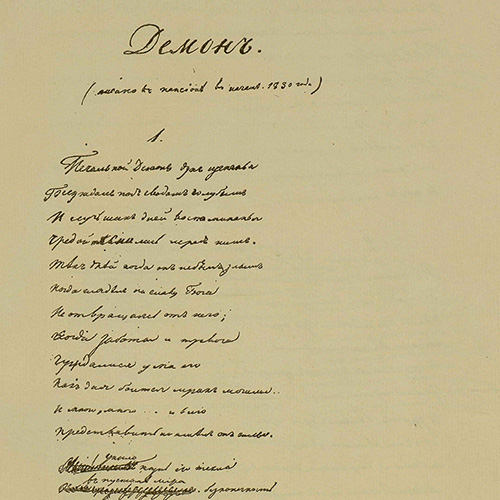
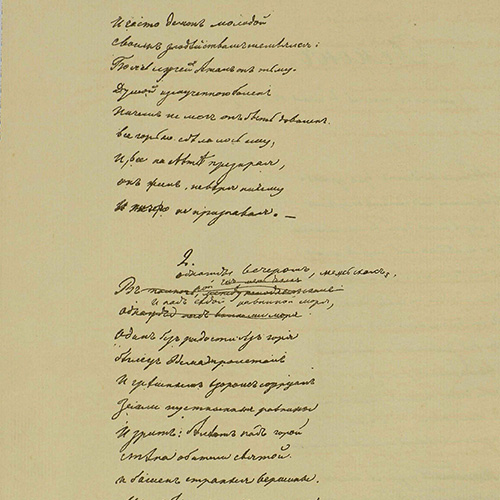
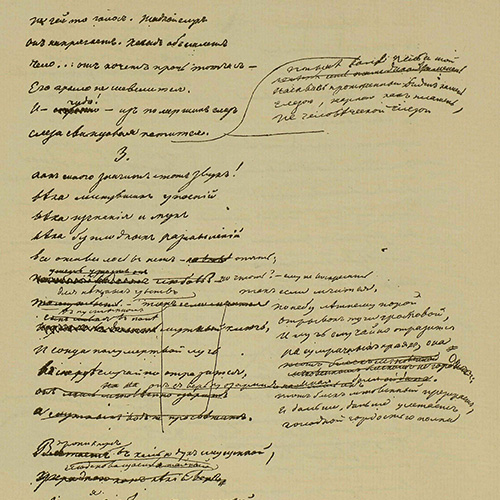
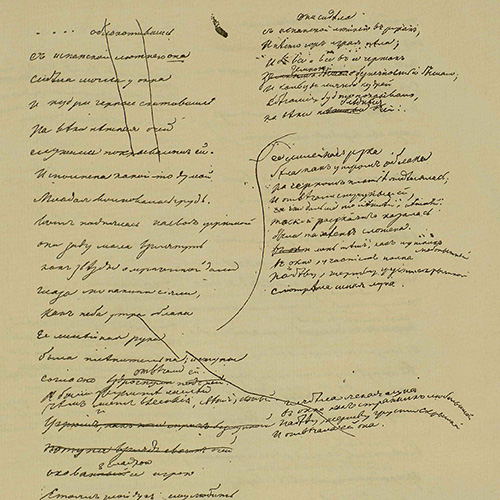
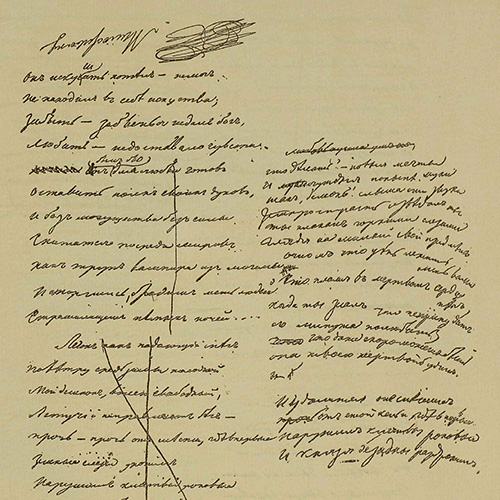
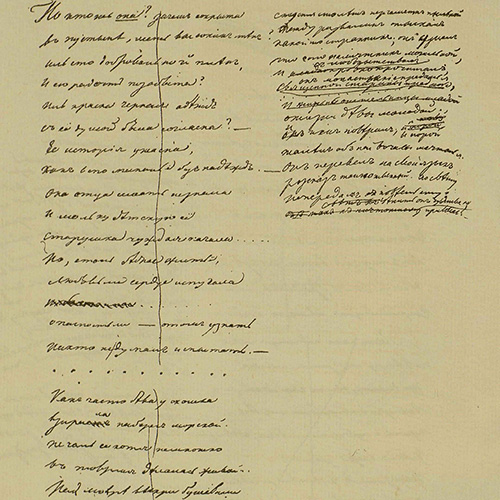
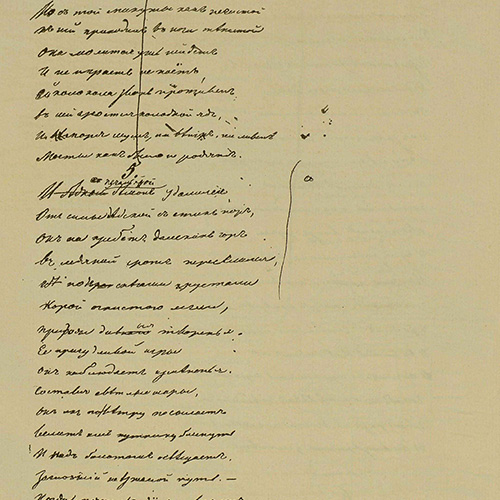
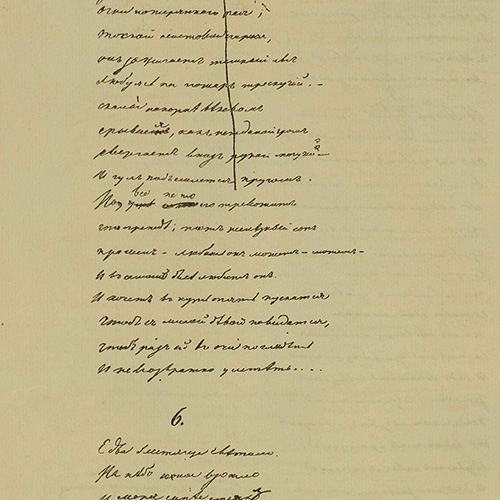
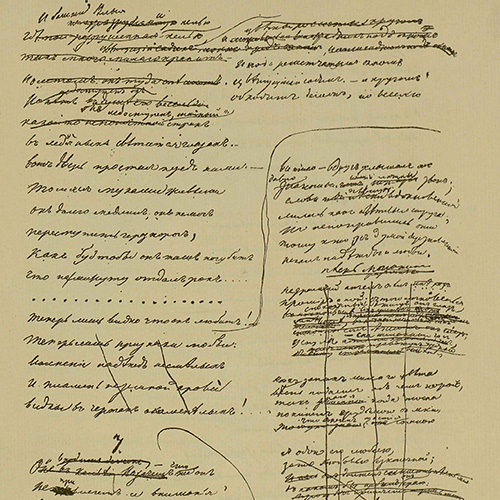
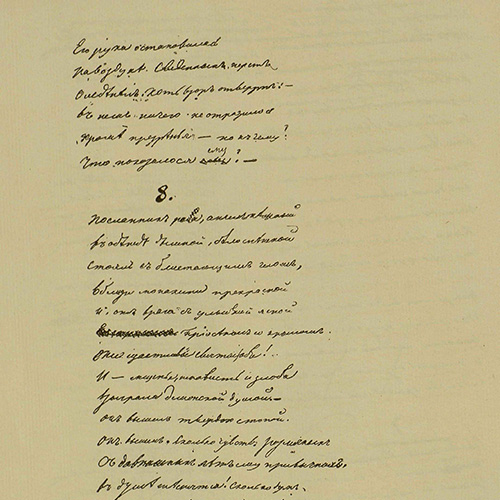
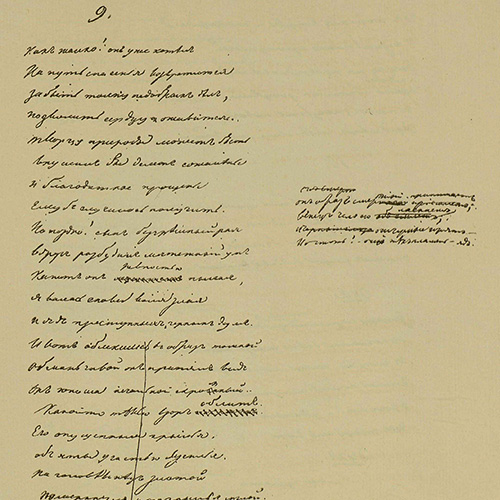
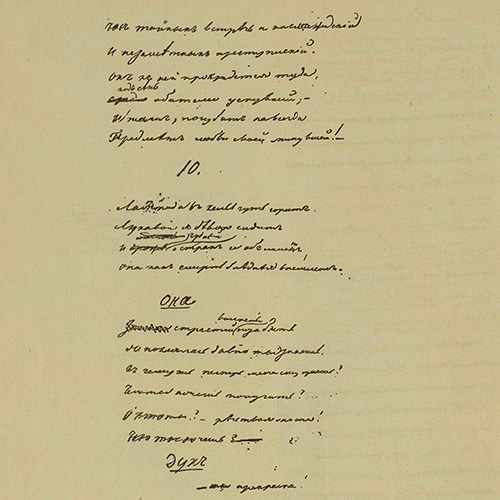
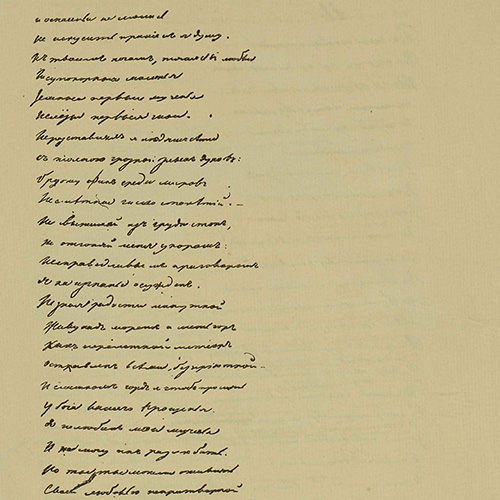
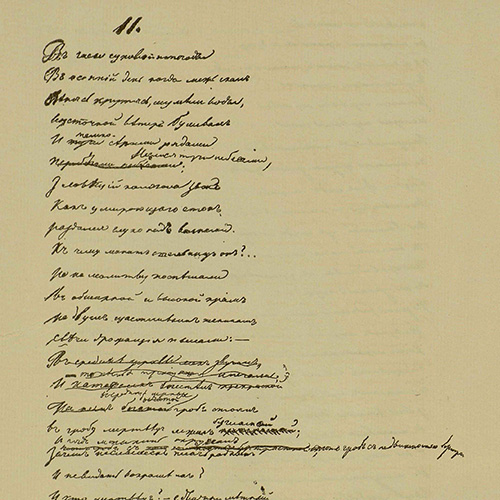
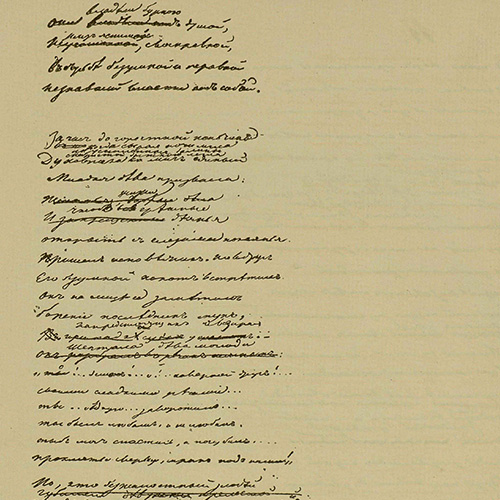
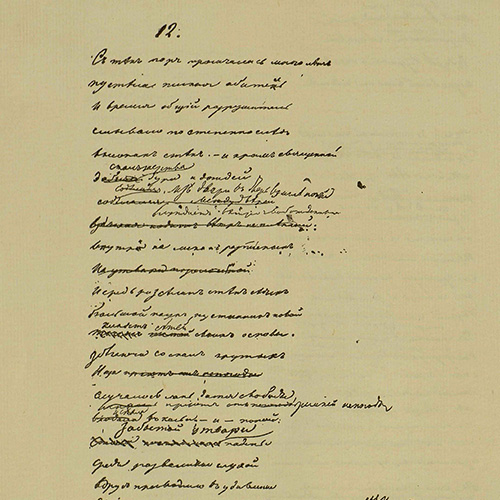
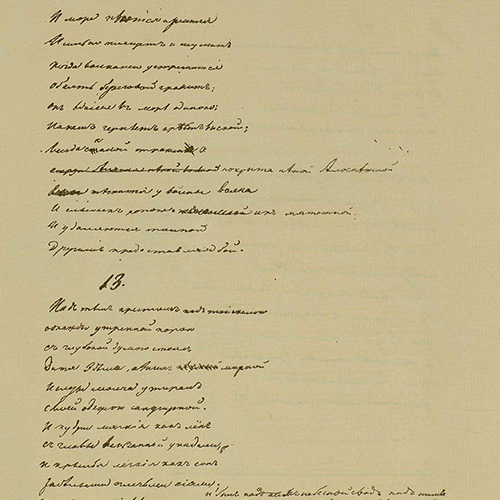
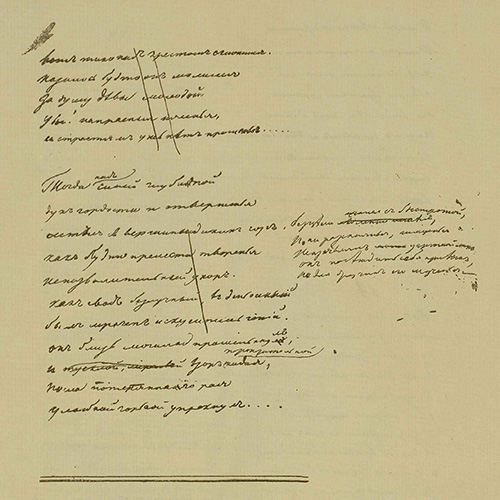
An Eastern Story
PART I
I
A Demon, soul of all the banished,
sadly above the sinful world
floated, and thoughts of days now vanished
before him crowdingly unfurled;
days when, in glory’s habitation,
he shone out a pure cherubim,
when comets dying on their station
rejoiced to exchange a salutation
of welcome and of love with him,
when through the vapours of creation,
hungry for knowledge, he flew on
with caravans in their migration
to space where headlong stars have gone;
with love and faith to lean upon,
happy first-born of our condition,
he knew no evil, no suspicion,
his mind undaunted by the length
of fruitless aeons sadly falling...
so much, so much there was... the strength,
the will now fails him for recalling!
II
He wandered, now long-since outcast;
his desert had no refuge in it:
and one by one the ages passed,
as minute follows after minute,
each one monotonously dull.
The world he ruled was void and null;
the ill he sowed in his existence
brought no delight. His technique scored,
he found no traces of resistance —
yet evil left him deeply bored.
III
Above the steep Caucasian places
heaven’s expatriate flew full-pelt:
below him, Kazbek’s diamond-faces
glittered with snows that never melt,
and far beneath them, dark, arresting
as some crevasse where snakes are nesting,
Daryal wound its twisted belt,
and Terek, lioness-like, was springing,
shaggily-maned all down its back;
it roared, and mountain beasts and swinging
birds high on their circuitous track
in the azure heard its lilting water;
and clouds from far-off southern lands
escorted him in gilded bands
toward horizon’s northern quarter;
and closely packed massifs of stone,
deep-sunk in their mysterious dreaming
had bowed their peaks as he had flown
above the bed where waves were gleaming;
and towered castles on the hard
precipice-top, above the entry
to Caucasus, in cloud stood guard
grim as some Cyclopean sentry!
How strange, how savage was the whole
divine landscape; but that proud soul
viewed with disdain and some derision
the product of his Maker’s will;
his lofty forehead at this vision
expressed no thought, exactly nil.
IV
Before him now the picture changes;
a different scene, a brilliant hue:
luxurious Georgia’s vales and ranges
are counterpaned-out for his view;
fortunate land, and sumptuous too!
Pillar-like ruined halls and granges,
and watercourses that run loud,
over the dappled pebbles rolling,
and nightingales that in the crowd
of roses voice their amorous trolling
to which no answer is allowed;
plane-trees inside their ivy sheathing
with branching shadows; caves where deer
at flaming midday hide their fear;
and life, and sound of leaves, and glow,
a hundred tongues that murmur low,
and plants in thousands gently breathing!
The sensual heat of high noondays,
nights which the never-failing sprays
of dew have drenched in aromatic,
and stars like eyes, clear and dramatic,
sharp as a Georgian maiden’s gaze!..
and yet, apart from envy’s chilling,
this natural glory could inspire
the barren exile with no thrilling
of new emotion or new Are;
and everything he contemplated
he either scorned or execrated.
V
A lofty hall, a broad courtyard,
grey-haired Gudál built for his pleasure...
the building cost his slaves much treasure
of tears and labour long and hard.
His towers in light of morning barred
with stripes of shade the mountain fairway.
Out of the cliff was hacked a stairway
from where the angled bastions gleam
down to the river; Gudál’s daughter,
white-veiled and flashing like a dream,
Princess Tamara, seeking water
runs down to the Arágva’s stream.
VI
From the steep mountain every minute
the voiceless house stares at the vale;
today, though, there’s a feast, pipes wail —
the hall resounds, wine’s flowing in it,
for Gudal has betrothed his girl,
the whole clan’s here, all’s in a whirl.
Up on the roof, among her bidden
girl-friends, the bride looks on the hall:
sitting on rugs, they sing and call
and play. Already sunk and hidden
by distant peaks the sun’s half-ball;
to keep the measure of their singing
the girls clap hands; the youthful bride
takes up her tambourine and, swinging
it round her head in sweeping-wide
circles, abruptly starts to glide;
one moment, like a bird, she dashes
and swoops; the next, she stands at gaze
and her moist eyes dart out their rays
from underneath malicious lashes;
and now she twitches a dark brow,
now suddenly she stops her gliding,
and halts, and makes a little bow;
meanwhile a heavenly foot is sliding
over the carpet; infantile
is the enjoyment in her smile.
Even the moonbeam’s fitful shivers
playing on water can’t in truth
rival that peerless smile: it quivers
as full of joy as life, or youth.
VII
I swear it on the midnight star,
on rays of sunset or of dawning,
never did autocrat of far
golden Iran, or earthly tsar,
kiss such an eye; on sultry morning
no sparkling fount of the harem
ever in summertime was splashing
a waist so heavenly in the flashing,
the pearly dewfall of its stream!
Or by no human fingers, pressing
a loved one’s brow in their caressing,
was ever hair like this undone;
since earth lost heaven, with humble duty
I swear it, never did such beauty
blossom beneath the southern sun.
VIII
She’d dance no more. Alas, there waited
a different morrow; she was fated,
she, heiress of the celebrated
Gudál, she, lively freedom’s own
nursling, to grim incarceration,
vowed to a strange expatriation
and to a family unknown.
Sometimes a secret hesitation
obscured the brilliance of her face;
and, with her, every single motion
was so compact of inner notion,
full of such sweet and simple grace,
that if the Demon, as he floated
above, had looked upon the bride,
thinking of brothers once devoted
he would have turned away — and sighed...
IX
And he did see her... For a second
by turmoil too deep to be reckoned
the Demon sensed that he was bound.
His dumb soul’s emptiness was slowly
filled with loud chords of blissful sound —
and once again he reached that holy
shrine where love, beauty, goodness gleam!..
And long he gazed, with fascination,
at the sweet view; as if in dream
his earlier blisses’ constellation
came as on summons from afar
and swam before him, star on star.
Then, riveted by unseen forces,
he came to feel a new sorrow;
emotion started on discourses
in language that he used to know.
Was this a sign of new begetting?
the cunning, covetousness-whetting
words came no more... had he forgot?
God never gave that: and he'd not
at any price accept forgetting...
. . . . . . . . . . . . . . . . .
X
At sunset, spurring on his beast,
the bridegroom to the wedding feast
with all impatient haste was riding,
and the green banks of brightly gliding
Arágva he had safely gained.
Behind him staggered, limped and strained
an endless line of camels bringing
his wedding gifts in towering load;
they gleamed, and all their bells were ringing
as they strung out along the road.
Sinodal’s lord himself was heading
the sumptuous caravan. His waist
inside its belt is tightly laced;
sabre and dagger-mounts are shedding
the sun’s reflections; his flintlock,
slung back, has notches on its stock.
And in the wind his sleeves are straying,
sleeves of a chukha1 that all round
with trimming of galloon is crowned.
A saddle where bright silks are playing;
a bit with tassels downward swaying;
and, lathered under him, his bold
charger with that rare hue of gold.
Karabakh’s brave offspring, ears with tension
pricked, all taut in apprehension
snorts as he squints down in the gloom
on the careering river’s spume.
A path to make the bravest shiver!
The cliff to leftward; deep as doom,
to right the chasm of the wild river.
It’s late; on snowy peaks the sliver
of radiance fades; mists rise apace...
the caravan begins to race.
XI
A wayside chapel... here is sleeping
since days of old, in God’s good keeping,
now sanctified, an ancient prince
cut down by vengeance. Ever since,
heading for feast or bloody fighting,
here, as he hurried on his way,
the traveller never missed finditing
the strongest prayer that he could say:
that prayer, so fervently directed,
kept him from Moslem’s knife protected.
But the bold bridegroom now disdained
the rite his forefathers maintained.
The crafty Demon with infernal
reveries had tempted him; in thought
beneath the gloom, the shades nocturnal,
it was his sweetheart’s lips he sought.
But suddenly, ahead, a figure —
no, two — no, more — a shot — whose trigger?
In clinking stirrups rising now,
ramming his fur cap on his brow
the dauntless prince in silence lifted
his Turkish whip; it flashed, it whirred,
crack went the lash; he spoke no word
as, eagle-like, he swooped, he shifted...
Another shot! a screaming man —
then from the valley dull groans rended
the still of night. The Georgians ran,
the battle all too soon was ended!
XII
Now calm returned; the sheepish flock
of camels on the road, in shock,
gazed back upon the dead, astounded;
and in the still of steppe and rock
dully their little bells resounded.
The sumptuous caravan was sacked;
above those Christian corpses packed
the bird of night invigilated!
no peaceful sepulchre awaited
their bodies, in some cloister’s trust,
where rested their forefather’s dust;
no sisters and no mothers, trailing
lengths of impenetrable veiling,
with sobs and prayers and sighs and wailing
visit their grave and mourn their loss!
And yet, by loving hands erected
here at the highway verge, protected
by the steep cliff, there stands a cross;
in spring the amorous, neglected
ivy, in emerald nets displayed,
clasps it in tenderest embraces;
and, turning in from far-off places,
the walker, tired from the long grade,
rests in the consecrated shade...
XIII
Swift as a deer the horse is rushing,
snorting as if for battle; hushing
sometimes, he halts in mid-career,
blows out his nostrils wide in fear,
and listens to the breeze’s sighing;
now thunderously his hooves are flying,
beating tattoos of rhythmic sort;
his mane all tangled, wildly spraying,
he gallops on without a thought.
He bears a silent horseman, swaying
across the saddle or, down-pressed,
collapsed upon that golden crest.
His hand no longer steers the bridle,
feet in the stirrups are thrust back,
bloodstreams are flowing, broad and idle,
across the cloth of his shabrack.
Brave galloper, you brought your master
out from the battle like a dart,
but the Ossetian’s bullet, faster
than you, in darkness found his heart!
XIV
In Gudál’s hall there’s grief and moaning,
the guests swarm out to the courtyard;
whose charger, broken past atoning,
outside the gates has fallen so hard?
and who’s the lifeless rider? traces
of war’s alarm lurk in the spaces
of his dark-favoured, furrowed brow.
On clothes, on weapons, blood is freezing;
his hand in a last furious squeezing
upon the mane is frozen now...
Oh, not for long the bride had waited
her young groom’s coming: and at least,
his princely word unviolated,
he galloped to the wedding feast...
Alas, no more that brave, hard-bitten
charger shall bear him — so it’s written!...
XV
Heaven’s punishment like thunder swooped
down on that family, so light-hearted!
pitiable, Tamara drooped
onto her bed; she sobbed, then started,
suddenly, tear on rolling tear,
her bosom laboured, breath oppressed her —
when, from above, a voice addressed her;
she seemed in magic tones to hear:
“Don’t weep, my child! no use in steeping
a voiceless corpse with tears unsleeping!
Such tears are no life-giving dew:
they simply cloud your eyes; such weeping
burns up complexion’s virgin hue!
he’s far from here, he’s past all knowing,
from him your grief can earn no praise;
celestial radiance now is glowing
before his incorporeal gaze;
for him heaven’s choirs are now intoning...
what are life’s paltry dreams, the oppressed
tears of a poor young girl, her groaning,
to the celestial country’s guest?
No mortal creature should be reckoned,
whatever be his lot, as worth —
believe me — for a single second,
your grief, my angel of the earth!
“On the heavens’ ethereal ocean,
rudderless, without a sail,
starry choirs in ordered motion
calmly float through vapour’s veil;
over heaven’s unbounded spaces,
unattainable, unheard,
leaving after them no traces,
pass the clouds in fleecy herd.
Times for meeting, or leave-taking,
bring them neither joy nor pain;
future brings them no wish-making,
past, no will to live again.
In the grievous hour of sorrows,
they are what you should recall;
take no heed for earthly morrows,
be uncaring, like them all!
“As soon as night on the Caucasian
summits has cast its mantle round,
as soon as its bewitching suasion
has stilled the world, as if spellbound;
as soon as on the cliff there passes
a night wind through the withered grasses,
and hidden deep in them a bird
cheerfully in the dark has stirred;
as soon as, under vineyard railing
thirstily drinking the unfailing
dewfall, the flower of night has bloomed;
as soon as the gold moon has loomed
silently from the mountain-sill,
looked at you sidelong in the still —
then I shall fly to you and keep
tryst with you till the daystar flashes,
and on the silk of your eyelashes
I shall infuse the gold of sleep...
XVI
Then the voice faded like illusion,
the sound had come, the sound died out.
She started up, she looked about...
and inexpressible confusion
reigned in her breast; fear, grief, joy, doubt,
compared to this were just delusion.
Her feelings bubbled up in rout;
her soul arose and snapped its shackles,
while fire came racing through each vein;
that voice, so strange it raised the hackles,
she thought she heard it speak again.
Just before daybreak, welcome-seeming
slumber had dimmed Tamara’s gaze;
and yet her mind was in a daze,
astonished with prophetic dreaming.
A stranger, mute, through mists that curled,
in beauty clad not of this world,
came to her, leaned above her pillow;
and in his glance was such a billow
of love and grief that you’d infer
all his compassion was for her.
This was no angel to befriend her,
this was no heaven-sent defender:
no crown of iridescent beams
adorned his forehead with its gleams;
nor one of those who burn together
in hell, no tortured sinner — no!
he was like evening in clear weather:
not day, nor night — not gloom, nor glow!
PART II
I
“Oh, father, father, cease from chiding,
leave your Tamara free from threat;
I weep: see how my tears are gliding,
they’ve flowed for days, they’re flowing yet.
It’s futile that from distant places
suitors crowd hither to my side...
Georgia abounds in maiden graces;
my fate is to be no one’s bride!..
Oh, father, throw stern words away.
You’ve noted how, from day to day,
victim of poison’s curse, I’m fading:
an evil dream, past all evading,
torments me; there’s no way to flee;
I’m lost, it’s pressing down on me!
To holy sanctuary send me,
send me to cool my raging head;
for there my Saviour will defend me,
with Him my anguish will be shed.
No worldly joys can now deceive me...
so in a shrine’s protecting gloom
rather let some dim cell receive me,
an early foretaste of the tomb ...”
II
And so to a secluded holy
cloister her parents took her; dressed
in a habiliment of lowly
hairshirting was that maiden breast.
But even in her monastic twilling,
as under damask’s figured gleam,
still with the same illicit dream
just as before her heart was thrilling.
At the altar, in the candle’s glow,
at moments of most solemn singing,
or while the voice of prayer was ringing,
would sound those tones she had to know.
And where the dim cathedral lifted
its vaulting, often would repair,
soundless and traceless as the air,
where the thin films of incense drifted,
a starlike figure, shining there;
it called, it beckoned her ... but where?
III
Between two hills, in shade abounding,
the sacred convent hid away
in planes and poplars tight-surrounding;
sometimes, when darkness came to stay
on the ravine, a lamp, appearing
in a faint glimmer through the clearing,
revealed where that young sinner lay.
In shade that almond-trees projected,
sad crosses in their rows protected
the voiceless graves; there the small birds
in choirs of song rehearsed their words.
Over the stones ran, bubbling, springing,
fountains of water, chilled as ice,
that under beetling cliffs would slice
across the valley - bed and, singing,
tumble on further through a scrub
whose bloom hoar-frosted every shrub.
IV
To northward, mountain peaks were showing.
And when Aurora, early glowing,
watches the smoky mists of blue
rise from the valley, layer on layer,
and when, face to the east, as due,
all the muezzins call to prayer,
and the clear voice of the bell-tower
wakens the people with its shaking;
in that pacific, solemn hour
at which the Georgian maiden, taking
her long and tapering pitcher, goes
for water down the steep, there grows
a mountain range, all capped in snows;
against the limpid heaven it throws
a wall of lilac past comparing;
or in the sunset hour it’s wearing
a chasuble that darkly glows;
and in the middle stands, invading
cloudland, the supreme peak by far,
Kazbek, all turbaned in brocading,
of Caucasus the mighty tsar.
V
With guilty thoughts in crowding session,
Tamara’s deaf to the intercession
of honest pleasures. In her eyes
the whole world’s wrapped in shade and sadness;
all things are cause for pain and madness —
night’s gloom, or radiance of sunrise.
No sooner has the chill infusion
of sleepy night flowed all around,
than she in frenzy and confusion
before the icon falls to ground;
she weeps; and in the silent tension
of night her sobs with apprehension
trouble the wayfarer’s attention:
“There groans some spirit of the height,
chained in a cavern, sadly stirring!”
he listens hard through the still night,
then gives his weary horse a spurring.
VI
Tamara at the window-sill
stares at the distant scene, and still
stares, languid, full of trepidation;
she sits in lonely meditation,
she sighs and waits, waits the whole day...
a whisper comes: he’s on his way!
Her dreams, his manner of appearing,
such flattery had not failed to reach
her heart; his sad gaze, the endearing,
the tender strangeness of his speech.
Herself not knowing rhyme or reason,
she’s pined and languished many days;
her heart may wish to pray in season
to holy saints, to him it prays;
worn out by struggle unabating,
if she lies down on slumber’s bed,
her pillow burns, she’s suffocating,
she starts up, shivering with dread;
her breast, her shoulders flame, she races
to breathe, she chokes, mist’s in her eyes,
her arms are thirsting for embraces,
and on her lips a kiss that dies...
VII
Now Georgia’s mountains had been vested
in aery robes of twilight hue.
Down to the cloister, as suggested
by his sweet wont, the Demon flew.
And yet he shrank, long minutes through,
he started back from violating
the peace in which that shrine was waiting.
There was a moment when he dreamed
of giving up his grim designing.
Around the high wall, brooding, pining,
he roamed: without a breeze, it seemed
the leaves had stirred from his returning.
In shade he looked up; her undone
window displays a lantern burning;
she’s long been waiting for someone!
And now, amid the silence reigning,
chingar's2 harmonious complaining
lilted, and strains of song began;
they flowed, these sounds, they ran and ran,
they pressed, like tears, hard on each other;
so tender was that song, you’d find
that up in heaven, for mankind,
its melodies had been designed.
Perhaps to a forgotten brother
some angel, moved to meet again,
had flown in stealth and raised this strain
to alleviate the other’s pain,
songs where time past found sweet narration?..
Love’s swooning and love’s agitation —
for the first time the Demon now
experienced them; in shock and shiver
he thinks of fleeing—but no quiver
stirs in his wing! from his dimmed brow
a heavy teardrop, a slow river...
what marvel! till today, quite near
that cell, there stands in wondrous fashion
a stone scorched by a tear of passion,
burnt through by an inhuman tear!..
VIII
And, as he enters, love is winning,
his soul is opened to the good;
he thinks, for life a new beginning
has come, as he had prayed it would.
The vague alarm of expectation,
the unspoken fear of the unknown,
as if at a first confrontation
to that proud soul had now been shown.
Then comes a grim prefiguration!
he enters — there in front of him
heaven’s envoy, the cherubim,
radiant, on his protective mission
keeps the fair sinner from all things
evil, defends her from perdition
inside the shadow of his wings;
and sudden light, from heaven down-beating,
blinded the Demon’s unclean sight;
instead of a sweet-spoken greeting,
heavy rebuke was prompt to smite:
IX
“Oh, soul of evil, soul unsleeping,
in midnight gloom, what tryst is keeping?
None of your votaries are here,
no breeze of ill has dared to roister
till now in this my well-loved cloister;
so bring no wicked footsteps near.
Who summoned you?” A crafty sneer
was Demon’s manner of replying;
all red with envy was his look;
and once more in his soul, undying,
hate’s poison brew began to cook.
“She’s mine!” cried out the grim contender,
“release her, for you come too late,
too late to serve as her defender
and stand in judgement on her fate
or mine. On her proud soul, I tell you,
I have affixed my seal above;
so from your cloister I repel you,
this is my kingdom, here I love!”
And on the victim, now past saving,
the Angel cast a sorrowing eye
and slow as slow, with pinions waving,
was drowned in the ethereal sky.
. . . . . . . . . . . . . . . . .
X
TAMARA
Who are you, tempter-tongue? What duty
brings you to me—from heaven? from hell?
What do you want of me?...
DEMON
Your beauty...
TAMARA
Tell me, who are you? Answer. Tell ...
DEMON
He to whose voice with rapt attention
you listened in the still midnight,
whose grief you guessed at, whose intention
spoke to your soul, whose vague dimension
you saw in dreaming; who can blight
hopes with one glance, and bring them crashing;
whom no one loves; who lives for lashing
his earthly slaves with furious beat,
the king of freedom and cognition,
heaven’s foe, and nature’s own perdition,
and yet, you see him at your feet!
I bring a message of devotion,
a prayer of love; for you I’ve kept
my first pains of earthbound emotion,
and the first tears I ever wept.
Oh, hear me out! oh, have some notion
of pity! back to heaven you
with just a single word could send me.
With your love’s raiment to defend me,
thus vested, I’d stand there, a new
angel with a new gleam to attend me;
oh, only hear me out, I pray —
I love you like a slave! the day
when I set eyes on you there started
in me a secret but whole-hearted
hatred for my immortal sway.
I found I envied such deficient
happiness as exists down here;
all life not yours was insufficient,
all life away from you brought fear.
Then in my dull heart, unexpected,
a glow began to warm and wake;
deep in an old wound and undetected,
grief started stirring like a snake.
What, without you, is life eternal?
what are my boundless realms infernal?
Just empty words, a loud discord,
a vast cathedral — with no lord!
TAMARA
Deceitful spirit, you must leave me!
Be still, I’ll not believe the foe...
Oh, my Creator... grief and woe!
no prayer comes out... my wits deceive me,
they falter, gripped by venom’s ire!
Listen, you pile up doom above me
with words of poison and of fire...
Tell me the reason why you love me!
DEMON
The reason why, fair one, you said?
Alas, I know it not! ... elated
with new life, from my guilty head
the thorny crown I relegated,
threw in the ashes all my days:
my heaven, my hell are in your gaze.
I love you with no earthly passion,
such love that you could never find:
with rapture, in the towering fashion
of an immortal heart and mind.
On my sad soul, from world’s first aeon,
deeply your image was impressed;
ever before me it progressed
through wastes of timeless empyrean.
My thoughts had long been stirred and racked
by just one name of passing sweetness:
my days in paradise had lacked
just your perfection for completeness.
If you could guess, if you could know
how much it costs in tribulation
throughout the ages’ long gradation
to take one’s pleasure, suffer woe,
to expect no praise for evil, no
prize for good deeds; what condemnation
to live for self, by self be bored
in endless struggle — no reward,
no crown, no reconciliation!
To regret all, to seek no prize,
to know, feel, see all things for ever,
to seek to hate the world — whatever
there may be in it, to despise!..
As soon as I from heaven’s employment
was banned by curses, from that day
all nature’s warmth and sweet enjoyment
grew chilled for ever, froze away;
bluer before me stretched the spaces;
I saw apparelled in their places,
like wedding guests, the lights I knew...
crowned, gliding one behind another;
and yet their former friend and brother
not one would recognise anew.
So, in despair, the expatriated,
the outcasts I began to call,
but faces, words, and looks that hated,
I failed to recognise them all.
And so, in horror, wings inflected,
I swooped away — but whither? why?
I know not... I had been rejected
by my old friends; like Adam I
found the world gone deaf-mute and dry.
So, at the current’s free impulsion,
a helpless and storm-crippled boat,
sailless and rudderless, will float,
knowing no goal for its propulsion;
so at the earliest morning-tide
a scrap of thunder-cloud will ride,
in heaven’s azure vaults the only
visible speck, unhalting, lonely,
will without trace and without sense
fly God knows whither, God knows whence!
Briefly I guided mankind’s thought,
briefly the ways of sin I taught,
discredited what’s noble, brought
everything beautiful to nought;
briefly ... the flame of all committed
belief in man I firmly drowned...
but was it worthwhile to confound
just hypocrites and the half-witted?
I hid where the ravines run deep;
I started, meteor-like, to sweep
on course through midnight’s darkest glooming...
A lonely wayfarer was looming,
enticed by a near lamp — to fall
over the cliff-edge, horse and all;
vainly he called out — bloody traces
followed him down the mountain-side...
but hatred’s tricks, its sad grimaces,
brought me a solace that soon died!
How often, locked in dusty battle
with some great hurricane, in shroud
of mist and lightning I would rattle
and swoop and storm amid the cloud,
and hope in elemental churning
to stifle all my heart’s regret,
to escape from thoughts that kept returning,
the unforgotten to forget!
What is the sum of the privations,
the labours and the grief of man,
of past, of future generations,
compared with just one minute’s span
of all my untold tribulations?
What is man’s life? his labour? why —
he’s passed, he’s died, he’ll pass and die...
his hopes on Judgement Day rely:
sure judgement, possible forgiving!
but my sorrow is endless, I
am damned to sorrow everliving;
for it, no grave in which to doze!
sometimes, snakelike, it creeps, or glows
like flame, it crackles, blazes, rushes,
or, like a tomb, it chokes and crushes —
a granite tomb for the repose
of ruined passions, hopes and woes.
[TAMARA
Why should I share your griefs, your inner
torments? why listen to your moan?
You’ve sinned .. .
DEMON
Towards you, I’m no sinner.
TAMARA
Someone will hear us!..
DEMON
We’re alone.
TAMARA
And God?
DEMON
Won’t glance at us: eternal
for heaven, but not for earth, his care.
TAMARA
And punishment, and pains infernal?
DEMON
What of them, if we both are there?]
TAMARA
Sufferer, stranger-friend, unwilling —
whoever you may be — I find
your words set secret pleasure thrilling,
ceaselessly they disturb my mind.
But if there’s cunning in your story,
if there’s a secret, wicked goal ...
oh, have some mercy! where’s the glory
to you, what value is my soul?
In heaven’s eye could I be reckoned
dearer than those you spurned instead?
they too are beauties, though unbeckoned!
as here, no mortal for a second
has dared defile their maiden bed...
Swear me a fateful oath... in anguish
I bid you swear... see how I languish;
you know the stuff of women’s dreams!
instinctively you soothe my terrors...
you understand my ways, my errors —
and you’ll have pity that redeems!
Swear it... from evil machinations
you’ll cease for ever, swear it now.
Have you no oaths, no adjurations,
have you no single sacred vow?..
DEMON
By the first day of our creation
I swear, and by its final night,
I swear by evil’s condemnation
and by the triumph of the right,
by downfall, with its bitter smarting,
by victories I dream to score,
by bliss of seeing you once more
and by the threat of once more parting.
I swear by all the souls of those
who serve me in predestined fashion,
I swear by my unsleeping foes;
by heaven, by hell, by earth’s profession
of holiness, and by your head,
I swear by your last look’s expression,
I swear by the first tear you shed,
the air your sweet lips are inhaling,
those silky curls that wave above,
I swear by bliss and by travailing,
I swear, believe it, by my love.
Old plans of vengeance and destruction
I have renounced, and dreams of pride;
henceforth, by evil’s sly seduction
no human spirit shall be tried;
with heaven I seek to end my warring,
to live for praying and adoring,
to live for faith in all that’s good.
Tears of repentance, as they should,
will from my forehead, thus deserving
your virtues, wash off heaven’s brand,
and may the world, calm, unobserving,
flourish untroubled by my hand!
Till now, you’ve found appreciation
at your true worth from me alone:
I chose you for my adoration,
laid at your feet my realms, my throne.
I need your love, my benefaction
to you will be eternal life;
in love, just as in evil action,
I’m strong and quite unmoved by strife.
With me, free son of the ethereal,
to stellar regions you’ll be whirled;
you’re fated to be my imperial
consort, and first queen of the world.
Then without pity, without caring,
you’ll learn to look down at the earth,
where no true bliss and no long-wearing
beauty exist, which brings to birth
only misdeeds and retribution,
where only paltry passions live;
where love and hate, without dilution
by fear, are past man’s power to give.
Surely you know how short and fleeting
is human love’s ephemeral rule?
just for a flash, young blood is heating —
then days go flying, blood runs cool!
Who can stand up to pain of parting,
or to new beauty’s tempting gleams,
to weariness or boredom starting,
or to the waywardness of dreams?
Be sure that you were never fated,
my consort, to destroy your bloom
and fade away incarcerated,
enslaved in envy’s narrow room,
amongst the cold and the small-minded,
the false friends and the open foes,
the fears, the toils that vainly grinded,
the fruitless hopes, the crushing woes.
No, pitifully, without passion,
you’ll not expire, in prayer, behind
high walls, removed in equal fashion
from God, and from all human kind.
Oh, no, you wonder of creation,
a different destiny is yours;
you face a different tribulation
and different bliss in bounteous stores;
give up all previous ambition,
renounce the fate of this sad world:
instead, a lofty, splendid mission
before your eyes will be unfurled.
A host of souls who owe me duty
I’ll bring, I’ll throw them at your feet;
magically for you, my beauty,
handmaids will labour, deft and fleet;
for you from the eastern star I’ll ravish
a golden crown; I’ll take for you
from flowers the midnight dew, and lavish
upon your crown that selfsame dew;
I’ll bring a sunset ray; ecstatic,
I’ll clasp it, belt-like, round your waist,
with breath of healing aromatic
the airs around you will be laced;
all day the strains of heavenly playing
will lull your hearing with their tune;
I’ll build you halls with an inlaying
of turquoise, rooms with amber strewn;
I’ll sound the bottom of the ocean,
high up above the clouds I’ll climb,
all, all, that’s earthly, my devotion
will give you — love me!..
XI
And this time
with ardent lips so lightly grazing
he kissed her trembling mouth, and then
answered her pleas, in language dazing
with sweet temptation; once again
those mighty eyes were fixed and gazing
deep into hers. He set her blazing.
He gleamed above her like a spark
or like a knife that finds its mark.
That devil triumphed! In the dark,
alas, to her bosom the infernal
poison of his embrace could pierce.
A cry resounded, tortured, fierce,
troubling the stillnesses nocturnal.
In it were love, and pain’s hard kernel,
reproaches, a last desperate prayer,
and then a hopeless, an eternal
farewell to life — all these were there.
XII
Meanwhile, alone, the watchman pacing
past the steep wall serenely made
his nightly duty-round, embracing
the iron gong that told his trade;
and near the cell of that young sinner
he slowed the measure of his tread;
above the gong his hand in inner
puzzlement poised, he halted dead.
And through the stillness all around him
he thought he heard an undertone,
two mouths that kissed, then came to astound him
a short, sharp cry, a feeble moan.
And a detestable suspicion
pierced to the old man’s heart... but stay,
a moment passed in this condition
and all was silent; far away
only a breeze began to play
and brought the sound of leaves that rustled;
in its dark bed the torrent bustled
and sadly murmured on its way.
In fear the old night-watchman hurries
to say a text from holy writ,
and chase the wicked thought that worries
with its bad spell his sinful wit;
he crosses with his quavering fingers
a breast disturbed by reverie’s force,
in silence he no longer lingers
but goes his customary course.
XIII
Like a sweet peri sleeping lightly
she lay inside her coffin now;
cleaner than counterpane, and whitely
blooming, the dull hue of her brow.
Lowered for ever were her lashes...
But heavens! who would not have supposed
the eyes beneath them simply dozed
and marvellously just reposed
waiting a kiss, or daystar’s flashes?
But fruitlessly the light of day
poured on them all its golden ray;
her parents’ lips kissed them but vainly
in speechless sorrow. All too plainly
from them there’s nothing has the power
to tear death’s seal off at this hour!
XIV
Never in festal days’ confusion
had sweet Tamara been so dressed,
in such bright hues, so rich a vest.
Flowers from her valley in profusion
(such is tradition’s strict behest)
above her shed their perfume; pressed
in her dead hand, they looked like making
farewell to earth, a last leave-taking!
and nothing in her face implied
to onlookers how she had died
in blaze of rapture and of passion;
no, all her features were instilled
with a calm beauty that was chilled,
expressionless in marble-fashion,
blank of all thought, of feeling’s breath,
impenetrable, just like death.
And a strange smile that had come fleeting
across her lips was frozen cold.
Of grief and much heartbreak, on meeting
any perceptive eye, it told:
it carried cool contempts impression,
the scorn of one prepared to die,
it carried a last thought’s expression
and, to the earth, a dumb goodbye —
of life now gone, a vain reflection,
deader than those death sets apart,
of eyes grown dim, a recollection
even more hopeless for the heart.
Just as, at sunset’s grave occasion,
far on the skyline the Caucasian
snow-ranges—when in molten gold
day’s chariot founders—iridescent,
their radiance for a moment hold,
in dark of distance incandescent —
and yet this half-dead light can show
no glimmer down to the benighted
desert, and no one’s path is lighted
by gleams those icy summits throw.
XV
Now every neighbour, each relation,
for the sad pilgrimage is bound.
His grey locks all in laceration,
beating his breast without a sound,
for the last time Gudál has mounted
his faithful, his white-crested horse,
and the cortege begins its course.
Three days and three nights must be counted
to reach the calm refuge she shares
with bones of her long-dead forebears.
Of every traveller and each village
the scourge, an ancestor of hers,
chained down by illness, all his pillage
repented — history so avers —
wished for past crimes to win redemption,
and vowed to build a minster, right
on top of a granitic height
where blizzard’s dirge had the preemption,
where no bird ventured but the kite.
And soon from Kazbek’s snows a lonely
temple arose, and on the crest
the bones of that wrong-doer only
in such a scene could find new rest;
so to a graveyard was converted
that rock, the kin of clouds on high:
as if, the nearer to the sky,
the tomb was warmer... or, averted
and shut away from human gaze,
as if death’s sleep were sounder-seeming...
vain hope! for dead men, there’s no dreaming
the joys, the griefs of earlier days.
XVI
A holy Angel through ethereal
immensities of heaven’s blue
winged it on golden pinions, who
was carrying off from things material
a sinful spirit as he flew.
And with sweet words of consolation
and hope he scattered all her doubt;
all trace of crime and tribulation,
with flowing tears he washed it out.
Already, from far off, there swept them
homeward the sounds of heavenly bliss —
when there flew up to intercept them
a hellish soul from the abyss.
He was as mighty as the roaring
whirlwind, as lightning did he shine;
proudly, and vyith insanely soaring
audacity he cried: “She’s mine!”
Tamara’s sinful soul was riding
tight-gripped against her guardian’s breast;
by prayer her terrors were suppressed.
And now her fate was for deciding,
again he stood before her eyes,
but, God! — too changed to recognise!
so evil was the whole impression,
so full of poison and aggression
and endless hatred; in a wave
the Demon’s motionless expression
breathed out the coldness of the grave.
“Begone, dark spirit of denial!”
so heaven’s ambassador replied:
“for long enough your wicked pride
has triumphed — God will now decide,
for this is judgement hour; her trial
is past, the days of test by fire;
with earth’s corruptible attire
from evil’s thrall she’s liberated.
Her soul is ours, and long-awaited!
Her spirit, one of those by right
whose life on earth is to be reckoned
a flash of sharpest pain, a second
of unattainable delight:
woven by God from an ethereal
substance are all their vital strings;
they were not made for things material,
nor made for them, material things!
In cruel, costly expiation
she has atoned for all her doubt.
She suffered love and tribulation —
and heaven for love has opened out.”
The Angel, with stern gaze unsleeping,
stared at the tempter, then on high,
his pinions joyfully upsweeping,
merged in the radiance of the sky.
Vanquished, the Demon execrated
his reveries and their mad scope,
was left once more to his inflated
arrogance, left there isolated
in all the world — no love, no hope!
Above Koishaur’s ravine, where climbs
the mountain through its rocky stages,
there stands, preserved to modern times,
a jagged wreck from bygone ages.
About it, tales for children’s ears
too frightful, linger in tradition...
And voiceless as an apparition,
witness of those uncanny years,
it lifts, through trees, its blackened towers.
Below, the aül houses spill,
the earth is green and bright with flowers;
a hum of voices grows, falls still
lost in the distance, and the tinkling
caravan bells sound far away,
while through the vapours, gleaming, twinkling,
the river shoots in foam and spray.
And vital, youthfully eternal,
loving the sunshine and the vernal
coolness, old Nature frolics there
just like a child without a care.
But the sad castle, after giving
long years of duty-service, ends
as some poor old man does, outliving
all of his dear ones and his friends.
Only its unseen dwellers, waiting
for moonrise, then begin to stir;
then is their time for celebrating!
they buzz, they scurry, and they whirr.
A spider, anchorite-beginner,
works at his web, the grey old spinner;
up on the roof a jolly pack
of lizard families are brawling;
a canny snake from his dark crack
comes out punctiliously crawling
across the flags of the old stair;
now in three coils he gathers there,
and now in one long streak he’s creeping,
just like a blade, all bright and steeled,
forgot on some old battlefield,
no use to heroes dead and sleeping!..
All’s wild, nowhere is any trace
of years gone by: no, in this place
Time’s hand has long been busy sweeping,
nothing there is that now recalls
the glorious state Gudál was keeping,
with his sweet daughter, in these halls!
But the church on the mountain-tower
where to the earth their bones were vowed,
kept safely by some sacred power,
can still be seen amidst the cloud.
By the church-door, on sentry-go,
a line of black granitic boulders,
with snowy mantles on their shoulders,
wear as breastplate against the foe
eternal ice’s glittering show.
Relics of landslide, dreaming masses
like waterfalls, grooved with crevasses,
hang down where they were snapped and caught
by frost, as if in frowning thought.
And there the blizzard goes patrolling,
puffing snow-dust from those grey walls,
now setting a lament a-rolling,
now answering with sentry-calls.
And hearing in some far direction
of a famed minster in this land,
from eastward, clouds in serried band
hurry to make their genuflection;
but on that circle of tombstones
no one now weeps, and no one moans.
There Kazbek’s cliff, in dour ill-humour,
locks up its booty far from harm,
and mankind’s everlasting rumour
troubles not that eternal calm.
____
1. Outer garment with sleeves that fold back. (Lermontov’s note.)
2. Chingar: A kind of guitar. (Lermontov’s note.)
Восточная повесть
Часть I
I
Печальный Демон, дух изгнанья,
Летал над грешною землей,
И лучших дней воспоминанья
Пред ним теснилися толпой;
Тех дней, когда в жилище света
Блистал он, чистый херувим,
Когда бегущая комета
Улыбкой ласковой привета
Любила поменяться с ним,
Когда сквозь вечные туманы,
Познанья жадный, он следил
Кочующие караваны
В пространстве брошенных светил;
Когда он верил и любил,
Счастливый первенец творенья!
Не знал ни злобы, ни сомненья,
И не грозил уму его
Веков бесплодных ряд унылый...
И много, много... и всего
Припомнить не имел он силы!
II
Давно отверженный блуждал
В пустыне мира без приюта:
Вослед за веком век бежал,
Как за минутою минута,
Однообразной чередой.
Ничтожной властвуя землей,
Он сеял зло без наслажденья,
Нигде искусству своему
Он не встречал сопротивленья —
И зло наскучило ему.
III
И над вершинами Кавказа
Изгнанник рая пролетал:
Под ним Казбек, как грань алмаза,
Снегами вечными сиял,
И, глубоко внизу чернея,
Как трещина, жилище змея,
Вился излучистый Дарьял,
И Терек, прыгая, как львица
С косматой гривой на хребте,
Ревел, — и горный зверь и птица,
Кружась в лазурной высоте,
Глаголу вод его внимали;
И золотые облака
Из южных стран, издалека
Его на север провожали;
И скалы тесною толпой,
Таинственной дремоты полны,
Над ним склонялись головой,
Следя мелькающие волны;
И башни замков на скалах
Смотрели грозно сквозь туманы —
У врат Кавказа на часах
Сторожевые великаны!
И дик и чуден был вокруг
Весь божий мир; но гордый дух
Презрительным окинул оком
Творенье бога своего,
И на челе его высоком
Не отразилось ничего,
IV
И перед ним иной картины
Красы живые расцвели:
Роскошной Грузии долины
Ковром раскинулись вдали;
Счастливый, пышный край земли!
Столпообразные раины,
Звонко-бегущие ручьи
По дну из камней разноцветных,
И кущи роз, где соловьи
Поют красавиц, безответных
На сладкий голос их любви;
Чинар развесистые сени,
Густым венчанные плющом,
Пещеры, где палящим днем
Таятся робкие олени;
И блеск, и жизнь, и шум листов,
Стозвучный говор голосов,
Дыханье тысячи растений!
И полдня сладострастный зной,
И ароматною росой
Всегда увлаженные ночи,
И звезды яркие, как очи,
Как взор грузинки молодой!..
Но, кроме зависти холодной,
Природы блеск не возбудил
В груди изгнанника бесплодной
Ни новых чувств, ни новых сил;
И все, что пред собой он видел,
Он презирал иль ненавидел.
V
Высокий дом, широкий двор
Седой Гудал себе построил...
Трудов и слез он много стоил
Рабам послушным с давних пор.
С утра на скат соседних гор
От стен его ложатся тени.
В скале нарублены ступени;
Они от башни угловой
Ведут к реке, по ним мелькая,
Покрыта белою чадрой1,
Княжна Тамара молодая
К Арагве ходит за водой.
VI
Всегда безмолвно на долины
Глядел с утеса мрачный дом;
Но пир большой сегодня в нем —
Звучит зурна2, и льются вины —
Гудал сосватал дочь свою,
На пир он созвал всю семью.
На кровле, устланной коврами,
Сидит невеста меж подруг:
Средь игр и песен их досуг
Проходит. Дальними горами
Уж спрятан солнца полукруг;
В ладони мерно ударяя,
Они поют — и бубен свой
Берет невеста молодая.
И вот она, одной рукой
Кружа его над головой,
То вдруг помчится легче птицы,
То остановится, глядит —
И влажный взор ее блестит
Из-под завистливой ресницы;
То черной бровью поведет,
То вдруг наклонится немножко,
И по ковру скользит, плывет
Ее божественная ножка;
И улыбается она,
Веселья детского полна,
Но луч луны, по влаге зыбкой
Слегка играющий порой,
Едва ль сравнится с той улыбкой,
Как жизнь, как молодость, живой.
VII
Клянусь полночною звездой,
Лучом заката и востока,
Властитель Персии златой
И ни единый царь земной
Не целовал такого ока;
Гарема брызжущий фонтан
Ни разу жаркою порою
Своей жемчужною росою
Не омывал подобный стан!
Еще ничья рука земная,
По милому челу блуждая,
Таких волос не расплела;
С тех пор как мир лишился рая,
Клянусь, красавица такая
Под солнцем юга не цвела.
VIII
В последний раз она плясала.
Увы! заутра ожидала
Ее, наследницу Гудала,
Свободы резвую дитя,
Судьба печальная рабыни,
Отчизна, чуждая поныне,
И незнакомая семья.
И часто тайное сомненье
Темнило светлые черты;
И были все ее движенья
Так стройны, полны выраженья,
Так полны милой простоты,
Что если б Демон, пролетая,
В то время на нее взглянул,
То, прежних братии вспоминая,
Он отвернулся б — и вздохнул...
IX
И Демон видел... На мгновенье
Неизъяснимое волненье
В себе почувствовал он вдруг,
Немой души его пустыню
Наполнил благодатный звук —
И вновь постигнул он святыню
Любви, добра и красоты!
И долго сладостной картиной
Он любовался — и мечты
О прежнем счастье цепью длинной,
Как будто за звездой звезда,
Пред ним катилися тогда.
Прикованный незримой силой,
Он с новой грустью стал знаком;
В нем чувство вдруг заговорило
Родным когда-то языком.
То был ли признак возрожденья?
Он слов коварных искушенья
Найти в уме своем не мог...
Забыть? — забвенья не дал бог:
Да он и не взял бы забвенья!..
X
Измучив доброго коня,
На брачный пир к закату дня
Спешил жених нетерпеливый.
Арагвы светлой он счастливо
Достиг зеленых берегов.
Под тяжкой ношею даров
Едва, едва переступая,
За ним верблюдов длинный ряд
Дорогой тянется, мелькая:
Их колокольчики звенят.
Он сам, властитель Синодала,
Ведет богатый караван.
Ремнем затянут ловкий стан;
Оправа сабли и кинжала
Блестит на солнце; за спиной
Ружье с насечкой вырезной.
Играет ветер рукавами
Его чухи3, — кругом она
Вся галуном обложена.
Цветными вышито шелками
Его седло; узда с кистями;
Под ним весь в мыле конь лихой
Бесценной масти, золотой.
Питомец резвый Карабаха
Прядет ушьми и, полный страха,
Храпя косится с крутизны
На пену скачущей волны.
Опасен, узок путь прибрежный!
Утесы с левой стороны,
Направо глубь реки мятежной.
Уж поздно. На вершине снежной
Румянец гаснет; встал туман...
Прибавил шагу караван.
XI
И вот часовня на дороге...
Тут с давних лет почиет в боге
Какой-то князь, теперь святой,
Убитый мстительной рукой.
С тех пор на праздник иль на битву,
Куда бы путник ни спешил,
Всегда усердную молитву
Он у часовни приносил;
И та молитва сберегала
От мусульманского кинжала.
Но презрел удалой жених
Обычай прадедов своих.
Его коварною мечтою
Лукавый Демон возмущал:
Он в мыслях, под ночною тьмою,
Уста невесты целовал.
Вдруг впереди мелькнули двое,
И больше — выстрел! — что такое?..
Привстав на звонких4 стременах,
Надвинув на брови папах,5
Отважный князь не молвил слова;
В руке сверкнул турецкий ствол,
Нагайка щелк — и, как орел,
Он кинулся... и выстрел снова!
И дикий крик и стон глухой
Промчались в глубине долины —
Недолго продолжался бой:
Бежали робкие грузины!
XII
Затихло все; теснясь толпой,
На трупы всадников порой
Верблюды с ужасом глядели;
И глухо в тишине степной
Их колокольчики звенели.
Разграблен пышный караван;
И над телами христиан
Чертит круги ночная птица!
Не ждет их мирная гробница
Под слоем монастырских плит,
Где прах отцов их был зарыт;
Не придут сестры с матерями,
Покрыты длинными чадрами,
С тоской, рыданьем и мольбами,
На гроб их из далеких мест!
Зато усердною рукою
Здесь у дороги, над скалою
На память водрузится крест;
И плющ, разросшийся весною,
Его, ласкаясь, обовьет
Своею сеткой изумрудной;
И, своротив с дороги трудной,
Не раз усталый пешеход
Под божьей тенью отдохнет...
XIII
Несется конь быстрее лани,
Храпит и рвется, будто к брани;
То вдруг осадит на скаку,
Прислушается к ветерку,
Широко ноздри раздувая;
То, разом в землю ударяя
Шипами звонкими копыт,
Взмахнув растрепанною гривой,
Вперед без памяти летит.
На нем есть всадник молчаливый!
Он бьется на седле порой,
Припав на гриву головой.
Уж он не правит поводами,
Задвинул ноги в стремена,
И кровь широкими струями
На чепраке его видна.
Скакун лихой, ты господина
Из боя вынес как стрела,
Но злая пуля осетина
Его во мраке догнала!
XIV
В семье Гудала плач и стоны,
Толпится на дворе народ:
Чей конь примчался запаленный
И пал на камни у ворот?
Кто этот всадник бездыханный?
Хранили след тревоги бранной
Морщины смуглого чела.
В крови оружие и платье;
В последнем бешеном пожатье
Рука на гриве замерла.
Недолго жениха младого,
Невеста, взор твой ожидал:
Сдержал он княжеское слово,
На брачный пир он прискакал...
Увы! но никогда уж снова
Не сядет на коня лихого!..
XV
На беззаботную семью
Как гром слетела божья кара!
Упала на постель свою,
Рыдает бедная Тамара;
Слеза катится за слезой,
Грудь высоко и трудно дышит;
И вот она как будто слышит
Волшебный голос над собой:
«Не плачь, дитя! не плачь напрасно!
Твоя слеза на труп безгласный
Живой росой не упадет:
Она лишь взор туманит ясный,
Ланиты девственные жжет!
Он далеко, он не узнает,
Не оценит тоски твоей;
Небесный свет теперь ласкает
Бесплотный взор его очей;
Он слышит райские напевы...
Что жизни мелочные сны,
И стон и слезы бедной девы
Для гостя райской стороны?
Нет, жребий смертного творенья,
Поверь мне, ангел мой земной,
Не стоит одного мгновенья
Твоей печали дорогой!
На воздушном океане,
Без руля и без ветрил,
Тихо плавают в тумане
Хоры стройные светил;
Средь полей необозримых
В небе ходят без следа
Облаков неуловимых
Волокнистые стада.
Час разлуки, час свиданья —
Им ни радость, ни печаль;
Им в грядущем нет желанья
И прошедшего не жаль.
В день томительный несчастья
Ты об них лишь вспомяни;
Будь к земному без участья
И беспечна, как они!
Лишь только ночь своим покровом
Верхи Кавказа осенит,
Лишь только мир, волшебным словом
Завороженный, замолчит;
Лишь только ветер над скалою
Увядшей шевельнет травою,
И птичка, спрятанная в ней,
Порхнет во мраке веселей;
И под лозою виноградной,
Росу небес глотая жадно,
Цветок распустится ночной;
Лишь только месяц золотой
Из-за горы тихонько встанет
И на тебя украдкой взглянет, —
К тебе я стану прилетать;
Гостить я буду до денницы
И на шелковые ресницы
Сны золотые навевать...»
XVI
Слова умолкли в отдаленье,
Вослед за звуком умер звук.
Она, вскочив, глядит вокруг...
Невыразимое смятенье
В ее груди; печаль, испуг,
Восторга пыл — ничто в сравненье.
Все чувства в ней кипели вдруг;
Душа рвала свои оковы,
Огонь по жилам пробегал,
И этот голос чудно-новый,
Ей мнилось, все еще звучал.
И перед утром сон желанный
Глаза усталые смежил;
Но мысль ее он возмутил
Мечтой пророческой и странной.
Пришлец туманный и немой,
Красой блистая неземной,
К ее склонился изголовью;
И взор его с такой любовью,
Так грустно на нее смотрел,
Как будто он об ней жалел.
То не был ангел-небожитель,
Ее божественный хранитель:
Венец из радужных лучей
Не украшал его кудрей.
То не был ада дух ужасный,
Порочный мученик — о нет!
Он был похож на вечер ясный:
Ни день, ни ночь, — ни мрак, ни свет!..
Часть II
I
«Отец, отец, оставь угрозы,
Свою Тамару не брани;
Я плачу: видишь эти слезы,
Уже не первые они.
Напрасно женихи толпою
Спешат сюда из дальних мест.
Немало в Грузии невест;
А мне не быть ничьей женою!..
О, не брани, отец, меня.
Ты сам заметил: день от дня
Я вяну, жертва злой отравы!
Меня терзает дух лукавый
Неотразимою мечтой;
Я гибну, сжалься надо мной!
Отдай в священную обитель
Дочь безрассудную свою;
Там защитит меня спаситель,
Пред ним тоску мою пролью,
На свете нет уж мне веселья...
Святыни миром осеня,
Пусть примет сумрачная келья,
Как гроб, заранее меня...»
II
И в монастырь уединенный
Ее родные отвезли,
И власяницею смиренной
Грудь молодую облекли.
Но и в монашеской одежде,
Как под узорною парчой,
Все беззаконною мечтой
В ней сердце билося, как прежде.
Пред алтарем, при блеске свеч,
В часы торжественного пенья,
Знакомая, среди моленья,
Ей часто слышалася речь.
Под сводом сумрачного храма
Знакомый образ иногда
Скользил без звука и следа
В тумане легком фимиама;
Сиял он тихо, как звезда;
Манил и звал он... но — куда?..
III
В прохладе меж двумя холмами
Таился монастырь святой.
Чинар и тополей рядами
Он окружен был — и порой,
Когда ложилась ночь в ущелье,
Сквозь них мелькала, в окнах кельи,
Лампада грешницы младой.
Кругом, в тени дерев миндальных,
Где ряд стоит крестов печальных,
Безмолвных сторожей гробниц,
Спевались хоры легких птиц.
По камням прыгали, шумели
Ключи студеною волной,
И под нависшею скалой,
Сливаясь дружески в ущелье,
Катились дальше, меж кустов,
Покрытых инеем цветов.
IV
На север видны были горы.
При блеске утренней Авроры,
Когда синеющий дымок
Курится в глубине долины,
И, обращаясь на восток,
Зовут к молитве муэцины,
И звучный колокола глас
Дрожит, обитель пробуждая;
В торжественный и мирный час,
Когда грузинка молодая
С кувшином длинным за водой
С горы спускается крутой,
Вершины цепи снеговой
Светло-лиловою стеной
На чистом небе рисовались
И в час заката одевались
Они румяной пеленой;
И между них, прорезав тучи,
Стоял, всех выше головой,
Казбек, Кавказа царь могучий,
В чалме и ризе парчевой.
V
Но, полно думою преступной,
Тамары сердце недоступно
Восторгам чистым. Перед ней
Весь мир одет угрюмой тенью;
И все ей в нем предлог мученью
И утра луч и мрак ночей.
Бывало, только ночи сонной
Прохлада землю обоймет,
Перед божественной иконой
Она в безумье упадет
И плачет; и в ночном молчанье
Ее тяжелое рыданье
Тревожит путника вниманье;
И мыслит он: «То горный дух
Прикованный в пещере стонет!»
И чуткий напрягая слух,
Коня измученного гонит.
VI
Тоской и трепетом полна,
Тамара часто у окна
Сидит в раздумье одиноком
И смотрит вдаль прилежным оком,
И целый день, вздыхая, ждет...
Ей кто-то шепчет: он придет!
Недаром сны ее ласкали,
Недаром он являлся ей,
С глазами, полными печали,
И чудной нежностью речей.
Уж много дней она томится,
Сама не зная почему;
Святым захочет ли молиться —
А сердце молится ему;
Утомлена борьбой всегдашней,
Склонится ли на ложе сна:
Подушка жжет, ей душно, страшно,
И вся, вскочив, дрожит она;
Пылают грудь ее и плечи,
Нет сил дышать, туман в очах,
Объятья жадно ищут встречи,
Лобзанья тают на устах...
VII
Вечерней мглы покров воздушный
Уж холмы Грузии одел.
Привычке сладостной послушный,
В обидель Демон прилетел.
Но долго, долго он не смел
Святыню мирного приюта
Нарушить. И была минута,
Когда казался он готов
Оставить умысел жестокой,
Задумчив у стены высокой
Он бродит: от его шагов
Без ветра лист в тени трепещет.
Он поднял взор: ее окно,
Озарено лампадой, блещет;
Кого-то ждет она давно!
И вот средь общего молчанья
Чингура6 стройное бряцанье
И звуки песни раздались;
И звуки те лились, лились,
Как слезы, мерно друг за другом;
И эта песнь была нежна,
Как будто для земли она
Была на небе сложена!
Не ангел ли с забытым другом
Вновь повидаться захотел,
Сюда украдкою слетел
И о былом ему пропел,
Чтоб усладить его мученье?..
Тоску любви, ее волненье
Постигнул Демон в первый раз;
Он хочет в страхе удалиться...
Его крыло не шевелится!
И, чудо! из померкших глаз
Слеза тяжелая катится...
Поныне возле кельи той
Насквозь прожженный виден камень
Слезою жаркою, как пламень,
Нечеловеческой слезой!..
VIII
И входит он, любить готовый,
С душой, открытой для добра,
И мыслит он, что жизни новой
Пришла желанная пора.
Неясный трепет ожиданья,
Страх неизвестности немой,
Как будто в первое свиданье
Спознались с гордою душой.
То было злое предвещанье!
Он входит, смотрит — перед ним
Посланник рая, херувим,
Хранитель грешницы прекрасной,
Стоит с блистающим челом
И от врага с улыбкой ясной
Приосенил ее крылом;
И луч божественного света
Вдруг ослепил нечистый взор,
И вместо сладкого привета
Раздался тягостный укор:
IX
«Дух беспокойный, дух порочный,
Кто звал тебя во тьме полночной?
Твоих поклонников здесь нет,
Зло не дышало здесь поныне;
К моей любви, к моей святыне
Не пролагай преступный след.
Кто звал тебя?»
Ему в ответ
Злой дух коварно усмехнулся;
Зарделся ревностию взгляд;
И вновь в душе его проснулся
Старинной ненависти яд.
«Она моя! — сказал он грозно, —
Оставь ее, она моя!
Явился ты, защитник, поздно,
И ей, как мне, ты не судья.
На сердце, полное гордыни,
Я наложил печать мою;
Здесь больше нет твоей святыни,
Здесь я владею и люблю!»
И Ангел грустными очами
На жертву бедную взглянул
И медленно, взмахнув крылами,
В эфире неба потонул.
X
Тамара
О! кто ты? речь твоя опасна!
Тебя послал мне ад иль рай?
Чего ты хочешь?..
Демон
Ты прекрасна!
Тамара
Но молви, кто ты? отвечай...
Демон
Я тот, которому внимала
Ты в полуночной тишине,
Чья мысль душе твоей шептала,
Чью грусть ты смутно отгадала,
Чей образ видела во сне.
Я тот, чей взор надежду губит;
Я тот, кого никто не любит;
Я бич рабов моих земных,
Я царь познанья и свободы,
Я враг небес, я зло природы,
И, видишь, — я у ног твоих!
Тебе принес я в умиленье
Молитву тихую любви,
Земное первое мученье
И слезы первые мои.
О! выслушай — из сожаленья!
Меня добру и небесам
Ты возвратить могла бы словом.
Твоей любви святым покровом
Одетый, я предстал бы там,
Как новый ангел в блеске новом;
О! только выслушай, молю, —
Я раб твой, — я тебя люблю!
Лишь только я тебя увидел —
И тайно вдруг возненавидел
Бессмертие и власть мою.
Я позавидовал невольно
Неполной радости земной;
Не жить, как ты, мне стало больно,
И страшно — розно жить с тобой.
В бескровном сердце луч нежданный
Опять затеплился живей,
И грусть на дне старинной раны
Зашевелилася, как змей.
Что без тебя мне эта вечность?
Моих владений бесконечность?
Пустые звучные слова,
Обширный храм — без божества!
Тамара
Оставь меня, о дух лукавый!
Молчи, не верю я врагу...
Творец... Увы! я не могу
Молиться... гибельной отравой
Мой ум слабеющий объят!
Послушай, ты меня погубишь;
Твои слова — огонь и яд...
Скажи, зачем меня ты любишь!
Демон
Зачем, красавица? Увы,
Не знаю!.. Полон жизни новой,
С моей преступной головы
Я гордо снял венец терновый,
Я все былое бросил в прах:
Мой рай, мой ад в твоих очах.
Люблю тебя нездешней страстью,
Как полюбить не можешь ты:
Всем упоением, всей властью
Бессмертной мысли и мечты.
В душе моей, с начала мира,
Твой образ был напечатлен,
Передо мной носился он
В пустынях вечного эфира.
Давно тревожа мысль мою,
Мне имя сладкое звучало;
Во дни блаженства мне в раю
Одной тебя недоставало.
О! если б ты могла понять,
Какое горькое томленье
Всю жизнь, века без разделенья
И наслаждаться и страдать,
За зло похвал не ожидать,
Ни за добро вознагражденья;
Жить для себя, скучать собой
И этой вечною борьбой
Без торжества, без примиренья!
Всегда жалеть и не желать,
Все знать, все чувствовать, все видеть,
Стараться все возненавидеть
И все на свете презирать!..
Лишь только божие проклятье
Исполнилось, с того же дня
Природы жаркие объятья
Навек остыли для меня;
Синело предо мной пространство;
Я видел брачное убранство
Светил, знакомых мне давно...
Они текли в венцах из злата;
Но что же? прежнего собрата
Не узнавало ни одно.
Изгнанников, себе подобных,
Я звать в отчаянии стал,
Но слов и лиц и взоров злобных,
Увы! я сам не узнавал.
И в страхе я, взмахнув крылами,
Помчался — но куда? зачем?
Не знаю... прежними друзьями,
Я был отвергнут; как эдем,
Мир для меня стал глух и нем.
По вольной прихоти теченья
Так поврежденная ладья
Без парусов и без руля
Плывет, не зная назначенья;
Так ранней утренней порой
Отрывок тучи громовой,
В лазурной тишине чернея,
Один, нигде пристать не смея,
Летит без цели и следа,
Бог весть откуда и куда!
И я людьми недолго правил,
Греху недолго их учил,
Все благородное бесславил
И все прекрасное хулил;
Недолго... пламень чистой веры
Легко навек я залил в них...
А стоили ль трудов моих
Одни глупцы да лицемеры?
И скрылся я в ущельях гор;
И стал бродить, как метеор,
Во мраке полночи глубокой...
И мчался путник одинокой,
Обманут близким огоньком;
И в бездну падая с конем,
Напрасно звал — и след кровавый
За ним вился по крутизне...
Но злобы мрачные забавы
Недолго нравилися мне!
В борьбе с могучим ураганом,
Как часто, подымая прах,
Одетый молньей и туманом,
Я шумно мчался в облаках,
Чтобы в толпе стихий мятежной
Сердечный ропот заглушить,
Спастись от думы неизбежной
И незабвенное забыть!
Что повесть тягостных лишений,
Трудов и бед толпы людской
Грядущих, прошлых поколений,
Перед минутою одной
Моих непризнанных мучений?
Что люди? что их жизнь и труд?
Они прошли, они пройдут...
Надежда есть — ждет правый суд:
Простить он может, хоть осудит!
Моя ж печаль бессменно тут,
И ей конца, как мне, не будет;
И не вздремнуть в могиле ей!
Она то ластится, как змей,
То жжет и плещет, будто пламень,
То давит мысль мою, как камень —
Надежд погибших и страстей
Несокрушимый мавзолей!..
Тамара
Зачем мне знать твои печали,
Зачем ты жалуешься мне?
Ты согрешил...
Демон
Против тебя ли?
Тамара
Нас могут слышать!..
Демон
Мы одне.
Тамара
А бог!
Демон
На нас не кинет взгляда:
Он занят небом, не землей!
Тамара
А наказанье, муки ада?
Демон
Так что ж? Ты будешь там со мной!
Тамара
Кто б ни был ты, мой друг случайный, —
Покой навеки погубя,
Невольно я с отрадой тайной,
Страдалец, слушаю тебя.
Но если речь твоя лукава,
Но если ты, обман тая...
О! пощади! Какая слава?
На что душа тебе моя?
Ужели небу я дороже
Всех, не замеченных тобой?
Они, увы! прекрасны тоже;
Как здесь, их девственное ложе
Не смято смертною рукой...
Нет! дай мне клятву роковую...
Скажи, — ты видишь: я тоскую;
Ты видишь женские мечты!
Невольно страх в душе ласкаешь...
Но ты все понял, ты все знаешь —
И сжалишься, конечно, ты!
Клянися мне... от злых стяжаний
Отречься ныне дай обет.
Ужель ни клятв, ни обещаний
Ненарушимых больше нет?..
Демон
Клянусь я первым днем творенья,
Клянусь его последним днем,
Клянусь позором преступленья
И вечной правды торжеством.
Клянусь паденья горькой мукой,
Победы краткою мечтой;
Клянусь свиданием с тобой
И вновь грозящею разлукой.
Клянуся сонмищем духов,
Судьбою братии мне подвластных,
Мечами ангелов бесстрастных,
Моих недремлющих врагов;
Клянуся небом я и адом,
Земной святыней и тобой,
Клянусь твоим последним взглядом,
Твоею первою слезой,
Незлобных уст твоих дыханьем,
Волною шелковых кудрей,
Клянусь блаженством и страданьем,
Клянусь любовию моей:
Я отрекся от старой мести,
Я отрекся от гордых дум;
Отныне яд коварной лести
Ничей уж не встревожит ум;
Хочу я с небом примириться,
Хочу любить, хочу молиться,
Хочу я веровать добру.
Слезой раскаянья сотру
Я на челе, тебя достойном,
Следы небесного огня —
И мир в неведенье спокойном
Пусть доцветает без меня!
О! верь мне: я один поныне
Тебя постиг и оценил:
Избрав тебя моей святыней,
Я власть у ног твоих сложил.
Твоей любви я жду, как дара,
И вечность дам тебе за миг;
В любви, как в злобе, верь, Тамара,
Я неизменен и велик.
Тебя я, вольный сын эфира,
Возьму в надзвездные края;
И будешь ты царицей мира,
Подруга первая моя;
Без сожаленья, без участья
Смотреть на землю станешь ты,
Где нет ни истинного счастья,
Ни долговечной красоты,
Где преступленья лишь да казни,
Где страсти мелкой только жить;
Где не умеют без боязни
Ни ненавидеть, ни любить.
Иль ты не знаешь, что такое
Людей минутная любовь?
Волненье крови молодое, —
Но дни бегут и стынет кровь!
Кто устоит против разлуки,
Соблазна новой красоты,
Против усталости и скуки
И своенравия мечты?
Нет! не тебе, моей подруге,
Узнай, назначено судьбой
Увянуть молча в тесном круге,
Ревнивой грубости рабой,
Средь малодушных и холодных,
Друзей притворных и врагов,
Боязней и надежд бесплодных,
Пустых и тягостных трудов!
Печально за стеной высокой
Ты не угаснешь без страстей,
Среди молитв, равно далеко
От божества и от людей.
О нет, прекрасное созданье,
К иному ты присуждена;
Тебя иное ждет страданье,
Иных восторгов глубина;
Оставь же прежние желанья
И жалкий свет его судьбе:
Пучину гордого познанья
Взамен открою я тебе.
Толпу духов моих служебных
Я приведу к твоим стопам;
Прислужниц легких и волшебных
Тебе, красавица, я дам;
И для тебя с звезды восточной
Сорву венец я золотой;
Возьму с цветов росы полночной;
Его усыплю той росой;
Лучом румяного заката
Твой стан, как лентой, обовью,
Дыханьем чистым аромата
Окрестный воздух напою;
Всечасно дивною игрою
Твой слух лелеять буду я;
Чертоги пышные построю
Из бирюзы и янтаря;
Я опущусь на дно морское,
Я полечу за облака,
Я дам тебе все, все земное —
Люби меня!..
XI
И он слегка
Коснулся жаркими устами
Ее трепещущим губам;
Соблазна полными речами
Он отвечал ее мольбам.
Могучий взор смотрел ей в очи!
Он жег ее. Во мраке ночи
Над нею прямо он сверкал,
Неотразимый, как кинжал.
Увы! злой дух торжествовал!
Смертельный яд его лобзанья
Мгновенно в грудь ее проник.
Мучительный ужасный крик
Ночное возмутил молчанье.
В нем было все: любовь, страданье,
Упрек с последнею мольбой
И безнадежное прощанье —
Прощанье с жизнью молодой,
XII
В то время сторож полуночный,
Один вокруг стены крутой
Свершая тихо путь урочный,
Бродил с чугунною доской,
И возле кельи девы юной
Он шаг свой мерный укротил
И руку над доской чугунной,
Смутясь душой, остановил.
И сквозь окрестное молчанье,
Ему казалось, слышал он
Двух уст согласное лобзанье,
Минутный крик и слабый стон.
И нечестивое сомненье
Проникло в сердце старика...
Но пронеслось еще мгновенье,
И стихло все; издалека
Лишь дуновенье ветерка
Роптанье листьев приносило,
Да с темным берегом уныло
Шепталась горная река.
Канон угодника святого
Спешит он в страхе прочитать,
Чтоб наважденье духа злого
От грешной мысли отогнать;
Крестит дрожащими перстами
Мечтой взволнованную грудь
И молча скорыми шагами
Обычный продолжает путь.
. . . . . . . . . . . . . .
XIII
Как пери спящая мила,
Она в гробу своем лежала,
Белей и чище покрывала
Был томный цвет ее чела.
Навек опущены ресницы...
Но кто б, о небо! не сказал,
Что взор под ними лишь дремал
И, чудный, только ожидал
Иль поцелуя, иль денницы?
Но бесполезно луч дневной
Скользил по ним струей златой,
Напрасно их в немой печали
Уста родные целовали...
Нет! смерти вечную печать
Ничто не в силах уж сорвать!
XIV
Ни разу не был в дни веселья
Так разноцветен и богат
Тамары праздничный наряд.
Цветы родимого ущелья
(Так древний требует обряд)
Над нею льют свой аромат
И, сжаты мертвою рукою,
Как бы прощаются с землею!
И ничего в ее лице
Не намекало о конце
В пылу страстей и упоенья;
И были все ее черты
Исполнены той красоты,
Как мрамор, чуждой выраженья,
Лишенной чувства и ума,
Таинственной, как смерть сама.
Улыбка странная застыла,
Мелькнувши по ее устам.
О многом грустном говорила
Она внимательным глазам:
В ней было хладное презренье
Души, готовой отцвести,
Последней мысли выраженье,
Земле беззвучное прости.
Напрасный отблеск жизни прежней,
Она была еще мертвей,
Еще для сердца безнадежней
Навек угаснувших очей.
Так в час торжественный заката,
Когда, растаяв в море злата,
Уж скрылась колесница дня,
Снега Кавказа, на мгновенье
Отлив румяный сохраня,
Сияют в темном отдаленье.
Но этот луч полуживой
В пустыне отблеска не встретит,
И путь ничей он не осветит
С своей вершины ледяной!
XV
Толпой соседи и родные
Уж собрались в печальный путь.
Терзая локоны седые,
Безмолвно поражая грудь,
В последний раз Гудал садится
На белогривого коня.
И поезд тронулся. Три дня,
Три ночи путь их будет длиться:
Меж старых дедовских костей
Приют покойный вырыт ей.
Один из праотцев Гудала,
Грабитель странников и сел,
Когда болезнь его сковала
И час раскаянья пришел,
Грехов минувших в искупленье
Построить церковь обещал
На вышине гранитных скал,
Где только вьюги слышно пенье,
Куда лишь коршун залетал.
И скоро меж снегов Казбека
Поднялся одинокий храм,
И кости злого человека
Вновь упокоилися там;
И превратилася в кладбище
Скала, родная облакам:
Как будто ближе к небесам
Теплей посмертное жилище?..
Как будто дальше от людей
Последний сон не возмутится...
Напрасно! мертвым не приснится
Ни грусть, ни радость прошлых дней.
XVI
В пространстве синего эфира
Один из ангелов святых
Летел на крыльях золотых,
И душу грешную от мира
Он нес в объятиях своих.
И сладкой речью упованья
Ее сомненья разгонял,
И след проступка и страданья
С нее слезами он смывал.
Издалека уж звуки рая
К ним доносилися — как вдруг,
Свободный путь пересекая,
Взвился из бездны адский дух.
Он был могущ, как вихорь шумный,
Блистал, как молнии струя,
И гордо в дерзости безумной
Он говорит: «Она моя!»
К груди хранительной прижалась,
Молитвой ужас заглуша,
Тамары грешная душа.
Судьба грядущего решалась,
Пред нею снова он стоял,
Но, боже! — кто б его узнал?
Каким смотрел он злобным взглядом,
Как полон был смертельным ядом
Вражды, не знающей конца, —
И веяло могильным хладом
От неподвижного лица.
«Исчезни, мрачный дух сомненья! —
Посланник неба отвечал: —
Довольно ты торжествовал;
Но час суда теперь настал —
И благо божие решенье!
Дни испытания прошли;
С одеждой бренною земли
Оковы зла с нее ниспали.
Узнай! давно ее мы ждали!
Ее душа была из тех,
Которых жизнь — одно мгновенье
Невыносимого мученья,
Недосягаемых утех:
Творец из лучшего эфира
Соткал живые струны их,
Они не созданы для мира,
И мир был создан не для них!
Ценой жестокой искупила
Она сомнения свои...
Она страдала и любила —
И рай открылся для любви!»
И Ангел строгими очами
На искусителя взглянул
И, радостно взмахнув крылами,
В сиянье неба потонул.
И проклял Демон побежденный
Мечты безумные свои,
И вновь остался он, надменный,
Один, как прежде, во вселенной
Без упованья и любви!..
На склоне каменной горы
Над Койшаурскою долиной
Еще стоят до сей поры
Зубцы развалины старинной.
Рассказов, страшных для детей,
О них еще преданья полны...
Как призрак, памятник безмолвный,
Свидетель тех волшебных дней,
Между деревьями чернеет.
Внизу рассыпался аул,
Земля цветет и зеленеет;
И голосов нестройный гул
Теряется, и караваны
Идут, звеня, издалека,
И, низвергаясь сквозь туманы,
Блестит и пенится река.
И жизнью, вечно молодою,
Прохладой, солнцем и весною
Природа тешится шутя,
Как беззаботное дитя.
Но грустен замок, отслуживший
Когда-то в очередь свою,
Как бедный старец, переживший
Друзей и милую семью.
И только ждут луны восхода
Его незримые жильцы:
Тогда им праздник и свобода!
Жужжат, бегут во все концы.
Седой паук, отшельник новый,
Прядет сетей своих основы;
Зеленых ящериц семья
На кровле весело играет;
И осторожная змея
Из темной щели выползает
На плиту старого крыльца,
То вдруг совьется в три кольца,
То ляжет длинной полосою,
И блещет, как булатный меч,
Забытый в поле давних сеч,
Ненужный падшему герою!..
Все дико; нет нигде следов
Минувших лет: рука веков
Прилежно, долго их сметала,
И не напомнит ничего
О славном имени Гудала,
О милой дочери его!
Но церковь на крутой вершине,
Где взяты кости их землей,
Хранима властию святой,
Видна меж туч еще поныне.
И у ворот ее стоят
На страже черные граниты,
Плащами снежными покрыты;
И на груди их вместо лат
Льды вековечные горят.
Обвалов сонные громады
С уступов, будто водопады,
Морозом схваченные вдруг,
Висят, нахмурившись, вокруг.
И там метель дозором ходит,
Сдувая пыль со стен седых,
То песню долгую заводит,
То окликает часовых;
Услыша вести в отдаленье
О чудном храме, в той стране,
С востока облака одне
Спешат толпой на поклоненье;
Но над семьей могильных плит
Давно никто уж не грустит.
Скала угрюмого Казбека
Добычу жадно сторожит,
И вечный ропот человека
Их вечный мир не возмутит.
____
1. Покрывало.
2. Вроде волынки.
3. Верхняя одежда с откидными рукавами.
4. Стремена у грузин вроде башмаков из звонкого металла.
5. Шапка, вроде ериванки.
6. Чингар — род гитары. (Прим. М. Ю. Лермонтова.)